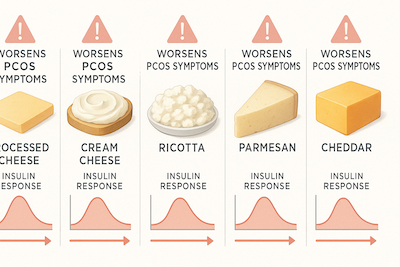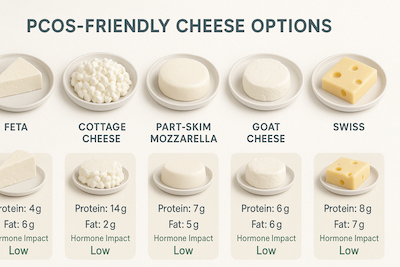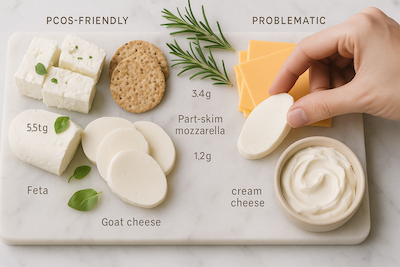If you're managing Polycystic Ovary Syndrome (PCOS), you may have heard conflicting advice about dairy products, especially cheese. While some cheeses can be part of a PCOS-friendly diet, others might exacerbate symptoms.
Let's explore which cheeses you might want to limit or avoid when managing PCOS.

Comparison of different cheese varieties and their potential impact on PCOS symptoms
Why Some Cheeses Can Be Problematic for PCOS
Certain cheeses may be less suitable for PCOS due to:
- High saturated fat content: Can worsen insulin resistance, a key factor in PCOS
- High sodium levels: May contribute to inflammation and water retention
- Added hormones: Present in some dairy products, these may disrupt hormonal balance
- High calorie density: Makes weight management more challenging, which is often a focus in PCOS care
- IGF-1 (Insulin-like Growth Factor): Some cheeses may elevate levels of this hormone, potentially worsening PCOS symptoms
Research from the Journal of Clinical Endocrinology & Metabolism suggests that dietary choices, including cheese consumption, can significantly impact insulin sensitivity in women with PCOS.
The 5 Worst Cheese Types for PCOS
| Cheese Type | Why It's Problematic | Better Alternative |
|---|---|---|
| Processed Cheese Products | High in additives, sodium, and unhealthy fats that contribute to inflammation and insulin resistance | Fresh mozzarella or string cheese |
| Cream Cheese | Contains up to 10g saturated fat per serving, which can exacerbate insulin resistance | Greek yogurt spread or cashew cheese |
| Ricotta Cheese | While nutritious, it's high in calories (124 cal per 1/4 cup) and can be easy to overeat | Low-fat cottage cheese |
| Parmesan Cheese | Very high in sodium (330mg per ounce), which can contribute to inflammation | Nutritional yeast for a similar flavor profile |
| Full-Fat Cheddar Cheese | Contains 9g saturated fat per ounce, potentially worsening insulin resistance | Reduced-fat cheddar or goat cheese |

PCOS-friendly cheese alternatives with their nutritional benefits
Why These Cheeses May Worsen PCOS Symptoms
1. Processed Cheese Products
Impact on PCOS: These products often contain additives like phosphates that can increase inflammation. They're also highly processed, with modified milk ingredients that may affect hormone balance.
Research insight: A 2022 study in the Journal of Nutrition found that highly processed dairy products were associated with higher inflammation markers in women with PCOS.
2. Cream Cheese
Impact on PCOS: With around 10g of saturated fat per serving, cream cheese can contribute to insulin resistance. It also contains minimal protein, making it less satiating than other options.
Hormonal effect: The high fat content can increase estrogen production, potentially disrupting the already imbalanced hormone levels in PCOS.
3. Ricotta Cheese
Impact on PCOS: Though it contains beneficial whey protein, full-fat ricotta is calorie-dense and easy to overconsume in dishes like lasagna or desserts.
Weight management challenge: Many women with PCOS struggle with weight management due to insulin resistance, making high-calorie foods particularly problematic.
4. Parmesan Cheese
Impact on PCOS: The extremely high sodium content (330mg per ounce) can worsen inflammation and fluid retention, both common concerns for women with PCOS.
Portion control issue: Its intense flavor makes it easy to use too much, leading to excessive sodium intake.
5. Full-Fat Cheddar Cheese
Impact on PCOS: The high saturated fat content can worsen insulin resistance, a central feature of PCOS. It's also calorie-dense, providing about 115 calories per ounce.
Better options: Reduced-fat versions or smaller portions as a flavor enhancer rather than a main ingredient.
Healthier Cheese Alternatives for PCOS
Instead of these potentially problematic cheeses, consider these PCOS-friendly options:
- Feta cheese: Lower in fat and calories than many other cheeses, with a strong flavor that means you can use less
- Low-fat cottage cheese: High in protein (12g per 1/2 cup), which helps balance blood sugar and promote satiety
- Part-skim mozzarella: Contains about half the saturated fat of cheddar while providing calcium and protein
- Goat cheese: Often better tolerated than cow's milk cheese, with a different fatty acid profile that may be less inflammatory
- Swiss cheese: Lower in sodium and lactose than many other cheeses, often making it a better choice for sensitive digestive systems
Real Experience: Melissa's Story
"After being diagnosed with PCOS, I was devastated thinking I had to give up all cheese. My nutritionist helped me understand that switching from processed cheese products to small amounts of goat cheese and feta not only helped my symptoms but made my meals more satisfying. I actually enjoy these flavorful cheeses more than the processed ones I used to eat!"
For more information on PCOS-friendly food choices, check out our PCOS-friendly meal planning guide or our guide to the best cheese options for PCOS.
Tips for Incorporating Cheese in a PCOS Diet
- Choose quality over quantity: A small amount of flavorful, high-quality cheese can be more satisfying than larger amounts of bland processed cheese
- Opt for lower-fat varieties when possible: Look for part-skim or reduced-fat options
- Use cheese as a flavor enhancer rather than a main ingredient: Think of it as a condiment rather than a central food
- Pair cheese with fiber-rich foods: The fiber helps slow digestion and minimize blood sugar impact
- Be mindful of portion sizes: Use measuring tools or a food scale until you can eyeball proper portions
- Consider fermented options: Some evidence suggests fermented dairy products may be better tolerated in PCOS
- Track your symptoms: Notice how different cheeses affect your individual PCOS symptoms
PCOS-Friendly Cheese Serving Sizes
- Hard cheese (cheddar, swiss): 1 oz (about the size of your thumb)
- Soft cheese (feta, goat): 1-2 tablespoons
- Cottage cheese: 1/2 cup
- Grated parmesan: 1-2 tablespoons
Common Myths and Misconceptions about Cheese and PCOS
- Myth: All cheese is bad for PCOS.
Reality: Some cheeses, when consumed in moderation, can be part of a balanced PCOS diet. The key is choosing types with better nutritional profiles and controlling portions. - Myth: Low-fat cheese is always the best choice.
Reality: Sometimes full-fat options in smaller portions can be more satisfying and have fewer additives. Some reduced-fat cheeses add extra sodium or fillers to compensate for flavor. - Myth: Cheese always causes inflammation in PCOS.
Reality: While some people with PCOS may be sensitive to dairy, not everyone experiences increased inflammation from cheese consumption. Individual responses vary significantly. - Myth: Dairy-free cheese alternatives are automatically healthier.
Reality: Many dairy-free cheese alternatives are highly processed and contain unhealthy oils. Read labels carefully when choosing plant-based alternatives. - Myth: You should completely eliminate cheese if you have PCOS.
Reality: Total elimination is rarely necessary. Most women with PCOS can include moderate amounts of carefully selected cheeses in their diet.
Complementary Lifestyle Changes
Remember, managing PCOS goes beyond just avoiding certain foods:
- Regular Exercise: Physical activity can help improve insulin sensitivity. Learn more about exercise for PCOS management.
- Stress Management: Chronic stress can exacerbate PCOS symptoms. Explore our tips on mindfulness for PCOS.
- Balanced Diet: Focus on whole foods, lean proteins, and complex carbohydrates. Check our guide on anti-inflammatory foods for PCOS.
- Supplementation: Some supplements may help manage PCOS symptoms alongside dietary changes. Our evidence-based supplement guide provides more information.
- Adequate Sleep: Poor sleep can worsen insulin resistance and hormone imbalances. Aim for 7-9 hours of quality sleep per night.
Frequently Asked Questions About Cheese and PCOS
Is all dairy bad for PCOS?
No, dairy affects women with PCOS differently. Some may benefit from eliminating dairy, while others can include moderate amounts of carefully selected dairy products like Greek yogurt and certain cheeses without negative effects. The key is observing your body's individual response.
Can I eat cheese if I'm trying to lose weight with PCOS?
Yes, in moderation. Choose protein-rich options like cottage cheese or part-skim mozzarella, control portions carefully, and track your caloric intake. The protein in cheese can help with satiety, potentially supporting weight management efforts.
Does organic cheese make a difference for PCOS?
Possibly. Organic cheese comes from cows not treated with synthetic hormones, which may be beneficial for women with hormone-sensitive conditions like PCOS. However, the fat and calorie content remains the same, so portion control is still important.
What about lactose intolerance and PCOS?
Many women with PCOS also have lactose intolerance. If you suspect this, consider aged cheeses like parmesan, cheddar, and swiss, which contain minimal lactose, or try lactose-free alternatives.
Are plant-based cheese alternatives better for PCOS?
Not necessarily. While they avoid dairy hormones, many plant-based cheeses are highly processed and contain inflammatory oils. Look for minimally processed options made with nuts, nutritional yeast, or other whole food ingredients.
Conclusion
While some cheeses may potentially worsen PCOS symptoms, this doesn't mean you need to eliminate all cheese from your diet. By being mindful of the types and quantities of cheese you consume, you can still enjoy this food while managing your PCOS effectively.
Focus on selecting PCOS-friendly cheese options, controlling portions, and observing how your body responds to different varieties.
Remember that individual responses vary greatly. What works for one person with PCOS may not work for another. Always listen to your body and consult with a healthcare provider or registered dietitian for personalized advice tailored to your specific PCOS presentation and symptoms.
Extra Tip
If you're unsure about how different cheeses affect you, consider keeping a food diary. Track the types and amounts of cheese you eat along with any symptoms you experience. This can help you identify any patterns or sensitivities specific to your body.
Take Action: Rethinking Your Cheese Choices for PCOS
Now that you're aware of which cheeses might not be the best for PCOS, here are some actionable steps you can take:
- Pantry Audit: Check your fridge and pantry for the cheeses mentioned as potentially problematic. Consider replacing them with healthier alternatives.
- Experiment with Alternatives: Try incorporating PCOS-friendly cheese options into your meals this week.
- Practice Portion Control: If you do consume cheeses that are less ideal for PCOS, be mindful of portion sizes. Use a food scale or measuring tools if needed.
- Read Labels: Next time you're grocery shopping, compare labels on different cheese products. Look for options lower in saturated fat and sodium.
- Keep a Food Diary: Start tracking your cheese consumption and any PCOS symptoms you experience. This can help you identify any personal triggers.
- Consult a Nutritionist: If you're unsure about how to balance cheese in your PCOS diet, consider speaking with a nutritionist who specializes in PCOS.
Remember, managing PCOS is about making informed choices that work for your body. By being mindful of your cheese consumption, you're taking an active role in managing your symptoms and improving your overall health.
Join Our PCOS Nutrition Community
Navigating PCOS-friendly nutrition can be challenging, but you don't have to do it alone. Join our supportive PCOS community to connect with others and access valuable resources:
- AI Coach and Nutritionist: Get personalized advice on making smarter cheese choices and other PCOS-friendly dietary decisions with our AI-powered coach.
- Newsletter: Subscribe to our newsletter for the latest PCOS nutrition research, PCOS-friendly recipes, and management tips delivered straight to your inbox.
- Social Media: Follow us on Instagram and Facebook for daily inspiration, nutrition tips, and creative ideas for PCOS-friendly meals.
- Telegram Channel: Join our Telegram channel for real-time updates and community discussions about PCOS nutrition and lifestyle management.
Special Offer for Dairy Lovers! Sign up for our newsletter today and receive a free e-book: "PCOS-Friendly Dairy Alternatives: Delicious Recipes and Nutrition Tips". Discover tasty ways to adapt your favorite cheesy dishes to be more PCOS-friendly.
Your journey to better health and enjoyable, PCOS-friendly meals starts here. Join our community and let's navigate the world of PCOS nutrition together!

Community Comments
Community Comments
Add a comment